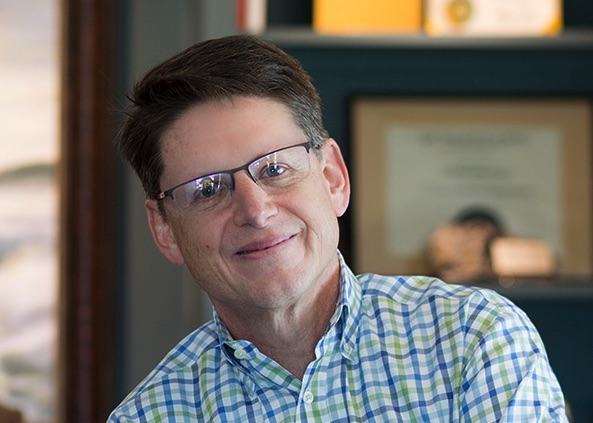Chester County Leadership: Michael Bontrager – Founder and Executive Chairman of the Board of Chatham Financial

 Michael Bontrager, the Founder and Executive Chairman of the Board of Chatham Financial, the 600-person financial advisory services and technology solutions firm based in Kennett Square, spoke with VISTA Today about spending the first part of his youth in Cincinnati, then moving to Lancaster County when he was 10 years old, when his father, a Mennonite minister, took a position at a little country church. He also discussed working for an appliance repairman for a dollar an hour when he was 13 and playing soccer through high school and into college.
Michael Bontrager, the Founder and Executive Chairman of the Board of Chatham Financial, the 600-person financial advisory services and technology solutions firm based in Kennett Square, spoke with VISTA Today about spending the first part of his youth in Cincinnati, then moving to Lancaster County when he was 10 years old, when his father, a Mennonite minister, took a position at a little country church. He also discussed working for an appliance repairman for a dollar an hour when he was 13 and playing soccer through high school and into college.
Bontrager shared the experience of his first job out of college, working for Chemical Bank, the decision to launch Chatham Financial and the company’s five purposes, only one of which is financial, as well as the opportunities he’s working on at Chatham and in Kennett Square.
Where were you born, and where did you grow up?
I was born the youngest of four kids in Greenwood, Delaware but spent my early years in Cincinnati, Ohio. When I was ten-years-old, my parents moved us to a little town in southern Lancaster County named Georgetown.
What brought your parents to Lancaster County?
My father is a Mennonite minister and he took a position at a little country church.
What memories do you have of growing up in Georgetown?
I loved living in the country. Georgetown was a very different environment from the city of Cincinnati—there were creeks, ponds, frogs and rabbits. What more could a ten year old want?
Did you play any sports growing up?
I was a soccer fanatic, playing throughout high school.
Did you continue to play soccer at college?
I walked on to the team in college, and while I played my freshman year, it was not clear I would be able to compete at the collegiate level. It was a division III school but often competed in the national tournament. I went to my coach at the end of my freshman year and asked for honest feedback on my chances of competing at this level. He told me if I made soccer my entire life, went to camps and played year-round, I might have a shot. Even though that wasn’t what I wanted to hear, I appreciated his honest feedback. After reflecting on this conversation, I decided to refocus my efforts on student government and other organizations on campus that would develop my leadership and entrepreneurial skills.
Had you had any leadership experience before that?
In high school, I was on different councils at school, and I was one of the church group leaders, so that gave me some experience. I enjoyed helping to build the organizations I was part of and began realizing I had some leadership abilities.
What kind of music were you listening to at the time?
I have always been and continue to be a big fan of Kansas which is why my four daughters can recite the lyrics of many 80’s Kansas tunes. When I first heard their album my junior year in high school, I loved their music with its classical overtones and thoughtfully poetic lyrics. My parents took us to symphony orchestra concerts when we lived in Cincinnati, so I grew up with a love of classical music.
Did you have any early jobs growing up?
At twelve or thirteen, I convinced a local appliance repairman to let me work for him for a dollar an hour. I remember thinking he was a genius because he could fix any appliance, but realized that he was not a great business person. I found myself trying to organize him and asking myself, “If this were my business, how would I run it?” It was through that experience that I realized that I wanted to be an entrepreneur.
Where did that insight come from?
I’m not exactly sure! My grandfather was an entrepreneur who was always starting something. Maybe it was his influence that allowed a thirteen year-old to dream of becoming the appliance king of Lancaster County some day!
What did you do after you decided you wouldn’t be the appliance king?
I went to Lancaster Mennonite High School, and in the late 70’s only about a quarter to a third of graduates went to college. I knew I wanted to go into business and be an entrepreneur, and ended up going to Wheaton College in Chicago.
Why Wheaton?
Besides being a Mennonite minister, my dad had another job at a bookstore in Lancaster. One evening when I was a high school senior he brought a young couple home whom he had met at the store. They were visiting Lancaster County and were unable to find a hotel room so my dad invited them home for dinner and a place to stay. The couple, as it turned out, were recent graduates of Wheaton College and encouraged me to check it out. I did and a weekend on campus convinced me it was right for me.
Looking back, was Wheaton a good choice for you?
Wheaton was fantastic for me in so many ways. Growing up in a rural area, I was not exposed to so many things that Wheaton opened my eyes to. I loved where I grew up and the goodness and authenticity of the people, but Wheaton provided the opportunity to meet professionals in a wide array of fields and be exposed to so many new ideas. In addition, my time at Wheaton gave me confidence that I could compete with kids who came from top high schools. My first semester, I was scared that I would be unable to make the grade and worked incredibly hard to prove to myself and others that I belonged there.
Who helped you along the way to help get you to where you are today?
So many people have contributed to making my life what it is. My first job out of college was in the credit training program of the old Chemical Bank in New York City (now a part of JPMorgan Chase). The father of someone I knew in college worked at the bank and he helped guide me through getting a job at the bank. I doubt that I would have ended up at this great entry job without Peter Hensel.
While I wanted to be an entrepreneur, I thought it was important to first gain fluency in finance and banking. I only intended to be at the bank for a few years, but continued to receive opportunities. Along the way I got married and the bank sent us to work in the Zurich, Switzerland branch for a few years. They then offered me a tremendous opportunity to move to New York City and join the Derivatives Group.
What did Chemical Bank see in you?
I think they saw that I was very driven and curious.
Who else helped you along the way?
Milton Cooper, the Chairman and CEO of Kimco Realty, was very important in the early days of Chatham. Kimco was one of my first clients when I went out on my own and hired me when they went public. Milton was very happy with my work and after the IPO offered to connect me with CEOs of real estate companies throughout the country. I took him up on it and we built a very strong reputation within real estate.
Was it a big risk when you started Chatham, or did you know it would succeed?
I think most entrepreneurs need to be somewhat naïve, which I certainly was. Had I known the risks then that I know now, I don’t know if I would have done it. I had a good job in NY and my wife was pregnant with our second child when we made the decision to launch. I tried to tell my wife how we could lose everything and she kept saying “let’s do this!” Her support was critical to the decision to launch and our early success.
Was there anyone else who helped you launch Chatham?
There are many people who helped make Chatham what it is today but two that stand out are Dave Hall and Ted McCullough. Dave was my first hire. He was the perfect complement to me and a great partner. He helped incubate the company in the earliest years. Ted was a derivatives trader for a New York bank and he took us to another level when he joined, especially by developing our young team to become great advisors. Both Dave and Ted embodied the culture and values that we were trying to create.
You’re halfway through 2019 – what are the challenges and opportunities you’re focused on?
Chatham is a purpose-driven multiple bottom lines company. We have five purposes, only one of which is financial and we are focused on being a positive force in the markets we serve.
Given the trust gap that exists between society and finance, we have sought to maximize trust rather than maximizing profit in all our relationships. Because of this, we have built incredibly strong relationships with our clients who have been asking us to do more and more. Over the years we have invested heavily in technology to support all these activities and we are continuing to invest in these areas.

What is Square Roots Collective?
Over the years I founded or co-founded numerous organizations and companies focused on encouraging our community to thrive for all of its people. As I transitioned out of the CEO role at Chatham at the beginning of this year, I have pulled all these non-profits, for-profits, partnerships and alliances under one umbrella and call it Square Roots Collective.
The projects are varied. The most visible venture is a family-friendly beer garden in Kennett Square called The Creamery, but we have numerous lesser known projects such as the Kennett Greenway, a 14-mile walking and biking trail through the Kennett Square area; The Constellation Network which brings local churches together to serve our community; and Maple Grove, which is an experimental model for transitional housing for people on the edge of homelessness.
Where do you see Square Root’s various initiatives going in the next few years?
There is a growing sense in our area and beyond that non-profits and for-profits need to work together if we want to bring about systemic changes. Square Roots believes it can play a role in encouraging this. We will continue to create new projects when we see opportunities for impact but believe our greatest opportunity could be encouraging collaboration.
What do you do in your free time?
I’m a pretty boring person. I read a lot. I enjoy traveling. I love discussing ideas and possibilities. And, I love to create projects and organizations that can make a long-term impact.
Finally, Mike What is the best piece of advice you’ve ever received?
Two ideas that have shaped me as a leader came from books. The first was from Peter Drucker in the early 1990s. He argued that in the knowledge industry, in many ways a leader needs to think like a non-profit in terms of the employees. People join non-profits because of a cause, not for the money. I’ve tried to build Chatham Financial that way, focusing on creating a culture and environment around our five purposes.
The other idea came from General Electric (I believe) and is a simple formula. Q X A = E. Q (quality of the idea) times A (the acceptance of the idea) equals E (effectiveness of the idea). I started to realize that even if you have the best ideas, if they aren’t accepted, they cannot be effective. Leaders need to focus on E, not simply on Q.
______
Publisher’s note: Laura Wagoner contributed to this Chester County Leadership profile.
Connect With Your Community
Subscribe to stay informed!
"*" indicates required fields






























![95000-1023_ACJ_BannerAd[1]](https://vista.today/wp-content/uploads/2023/03/95000-1023_ACJ_BannerAd1.jpg)

















